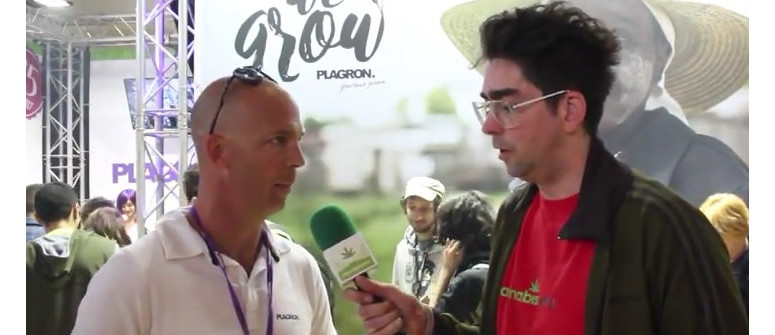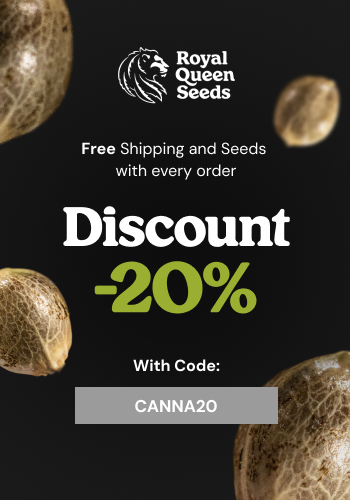Interview with Plagron Nutrients

Plagron is one of the most prominent suppliers of cannabis nutrients. Check out this interview with Mark about nutrients and more.
Plagron is one of the most prominent and famous suppliers of fertilisers, substrates and additives in the cannabis world. With more than 25 years of experience these guys know what cannabis plants need and can provide the needed goods for the various growing methods.
Imagining that they could answer a lot of our questions about cultivating marijuana, we decided to talk to Mark Bovens, the growing specialist at Plagron and ask him to share some of his knowledge with us.
We met at Spannabis 2017 where we had the opportunity to talk to him about the 25th anniversary of Plagron and to pick his mind.
For their 25th anniversary Plagron decided, instead of a big party, to set up an agriculture project in Mooi River, South Africa. Plagron named this project "Together We Grow". Great project guys! Check out their introduction video here below:
Interview transcript
Renzo: So we’re here at Spannabis 2017 for CannaConnection, and we are here with Mark from Plagron, one of the main sponsors of the festival. And you guys have your 25th anniversary this year, is that right?
Mark: Yes, we started in 1992 in The Netherlands, so here on Spannabis we use the occasion to invite our clients and have a good time to celebrate our anniversary. For the occasion of our anniversary we organized a project in Africa to support 1450 children of the Bruntville Primary School that live below the poverty line. And we show a very beautiful movie about this project here at Spannabis.
Renzo: OK, wow, that’s a very noble idea.
Mark: Yeah well, marketing costs a lot of money, and then it’s nice if you can do it in a responsible way by giving something back to the society.
Renzo: You guys have been around very long and probably are one of the oldest companies in the cannabis scene when it comes to growing and nutrients, but maybe you could give a small introduction on Plagron? For the people who don’t know Plagron that well.
Mark: Plagron is a supplier of substrates, fertilisers and additives for plant growth. Our assortment exists for 4 growing methods. Which in general represent all the growing methods that people use all over the world. So we have the 100% natural growing method, which only contains control union certified organic products. Then we have the 100% terra method. Which is with mineral fertilisers on soil. We have the hydroponic growing method on coco fiber.
And then for the real control freaks we have the 100% hydroponic growing method. Our 5th product group is the universal group, which contains all the additives which the clients can combine themselves with one of the growing methods.
Renzo: Maybe I can ask you a question that might be useful for a beginning grower. If somebody wants to grow his or her first cannabis strain, is there some useful information on which growing method to choose from? Would it be terra, would it be coco, or would it be for instance hydroponics immediately?
Mark: I would advice the 100% natural method because in this organic grow method you can take profit of the natural auto-regulation which exists in nature. In the forest there is nobody that has to control the pH levels or has to give the fertilisers, because it’s all naturally controlled by nature itself.
So with our 100% natural growing method for example, you don’t need to control the pH as that is auto-regulated. The organic fertilisers are slow released so you can’t burn the plants quickly. The soils themselves contain fertilisers of their own so if you are a bit late with giving the fertilisers, the soil will do this for the plants.
Like this you can create fruity and really nicely tasting product while some of the problems that exist in the methods for the more experienced growers, can hardly occur.
Renzo: That’s good to know. When reading about plants and fertilisers, you read about pH or the N and the P… maybe you can explain a bit what these things mean?
Mark: You mean the N, P and K? These are 3 nutritive elements. Nitrogen, Phosphorus and Potassium. Which are the basic nutrients of the plants. Of course a plant uses way more chemical elements, but all the other ones are used in much smaller amounts.
In general you can say that the N for Nitrogen is mostly used in the vegetative growing stage. So a fertiliser that is really rich in Nitrogen is in general better suited for the growing stage. Phosphorus and Potassium, although they have other functions, are mostly used during the flowering stage, to create the flowers.
So a fertiliser that is rich in Potassium and Phosphorus in generally better suited for the flowering stage. So somebody who has a bit of knowledge about how nutrients work, can look at the NPK and he will have directly a general impression of how this fertiliser will work.
Renzo: So then you know in which plant stage what nutrients to give?
Mark: Exactly. And of course every plant has different needs. Although most fertilisers can work with a lot of different plants, it is possible that a certain NPK in one fertiliser is better suited than another fertiliser.
Renzo: In the world of cannabis growing, there is mostly a difference in Sativa dominant strains and Indica dominant strains. Is there then also different feeding needed for those two different plants? Or is a plant a plant is a plant in the end…?
Mark: No. Every strain has different needs. In general our fertilisers or our feeds are able to feed the plant from beginning until the end in a really good way. But with other products, like additives, you have the possibility to steer it a bit when necessary.
For example in the 100% natural method, just another reason why I advice this method to beginning growers, the plant more or less can absorb the nutritive that it needs and the soil has the capacity to absorb nutrients that are not directly used. So even if you offer a general amount of Nitrogen, Phosphorus and Potassium, the plant will get everything that it needs, without being bothered by stuff that be given too much.
Renzo: But when knowing exactly what to give to which plant or strain, can you still use the advantage of specific differences between the different nutrients and feedings for a Sativa or an Indica?
Mark: Well every plant is different of course. And before you can get the most optimal result out of a plant, you need to know it. It needs to get the optimal model to reach the highest yield. You want to have a growing cycle that is as short as possible but still gives a plant that is big enough.
So since there are quite some differences in the developments of the different strains, it is important that you know your plant. You can’t take a new strain and expect to immediately have the best growing method from the beginning.
Renzo: Do you yourself still experiment a lot?
Mark: Well I moved to Spain 3 years ago and I have a big garden. And since I am the product manager for Plagron, it’s more or less part of my responsibility to grow. But it’s also my passion of course. I have been passionate about horticulture since I was 13 so even if I wouldn’t be the product manager, I would be doing it anyhow for fun and for the passion of the plants.
Renzo: Is there a big difference between the soil that should be used for indoor growing and outdoor growing?
Mark: The biggest difference is that the growing stage for outdoor growing is way longer. And the plants of course will also be way bigger. So when looking at Nutrients, the difference is that you need way more growing fertiliser for the longer growing stage.
A lot of people that grow outdoors use the soil that is in their garden, but of course this soil is less optimized than the professional Plagron soil. But because you have less control over the environment, it is perhaps also less needed to try to optimize everything in the substrate. On the other side; it is a fact that with a soil that is specifically developed for the purpose that you are using it for, and not just the soil that is in your garden, your results can be significantly better.
But if you are growing in a climate that is already not completely optimal, then it might be too much of an investment for what you can reach in the end, so I understand that people will try to use the soil that is already in your garden. But Plagron also offers soil improvers that can improve the soil in your garden.
Renzo: Like tabs?
Mark: No, we for example have Calcium Kick, which can help you to control and stabilise the pH values. We have the Mega Worm worm castings, which add a lot of micro-life and organic materials to your soil. Besides that we the Supermix. This is a mixture of natural solid fertilisers, which are selected in such a way that the nutrients are time-released according to the needs of the plants.
Like we were saying before; the plant will need more Nitrogen in the beginning and more Phosphorus and Potassium in the later stage. Supermix will release the nutrients in that way. We also sell Bat Guano, which is a unique natural fertiliser, because in the way you find (bat feces) in nature, it’s already a complete fertiliser containing the right amounts of Nitrogen, Phosphorus and Potassium and trace elements without any processing.
In our business the Bat Guano has the reputation to give a really nice creamy smell and to have a really good influence on the quality of the crop. Bat Guano and our soil, the Batmix, which is fertilised with Bat Guano, are from the old days. These are the products that Plagron offers and everybody knows.
Renzo: Can nutrients also have an influence on problems that occur doing growing? Like spider mites or insects.
Mark: A plant that is well feeded in general will be more vital and have more resistance, just like human beings.
Renzo: But isn’t it so with humans that if you eat more sweets, you might be more interesting prey for mosquitoes? Is it the same with plants?
Mark: Yes absolutely. Plants make substances that can repel insects themselves. And for example it is even possible that in a field of plants, when the left corner of the field starts to get attacked by insects, they manage to communicate this to the other plants in the field. So then the plants on the other side of the field will start to increase the production of these repelling substances to increase their resistance.
Renzo: But can this be done with specific nutrients as well?
Mark: Well, the clearest examples are vitamins and antioxidants. Take a human for instance. Somebody that only eats a lot of fast-food will get fat, but won’t have a lot of energy. While somebody who eats only organic food and vegetables gets a lot of antioxidants and vitamins and less likely get the flu. It’s the same thing with plants.
With our Alga fertilisers from the 100% natural line, which is made from Algae, we offer a lot of vitamins and antioxidants, which naturally occur in the Algae. And the organic material in the algae is also stimulating the soil life in the soil, which can also create vitamins, antioxidants and amino acids that can feed and stimulate the plant. So I would say that the biggest difference would be between the standard organic growing and mineral growing.
Organic growing offers these vitamins and antioxidants and stimulates the soil life, which in general stimulates health for your plants. Mineral fertilisers themselves don’t feed the soil life and in general have a decreasing effect on the soil life. They don’t offer these vitamins and antioxidants themselves. Luckily we have plant additives that can offer these things also in a mineral growing method. But they are not naturally available like in the 100% natural growing method
Renzo: Ok, that’s some good information. Well, I will not hold you up any longer. Let’s stay in touch and let’s keep informing our people. Check out Plagron people! They are doing a great job! Thank you very much Mark!
Mark: Thank you too!





